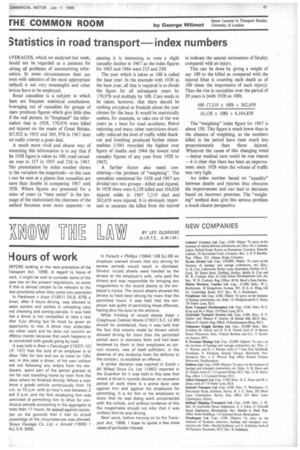1 ,014
Page 63

If you've noticed an error in this article please click here to report it so we can fix it.
E
BY LES OLDRIDGE, A.LR.T.E., A.11.01.LM.1.
I-lours of work
3EFORE looking at the new provisions of the fransport Act, 1968, in regard to hours of vork, it might be well to consider some of the :ase law on the present regulations, as some 4 this is almost certain to be relevant to the lew provisions when they come into operation.
In Parkinson v Axon 1119511 2K.B. 678) a Inver, after 4 hours driving, was allowed to issist porters and sorters in unloading vans Ind checking and sorting parcels. It was held ,hat a driver is not compelled to take a rest ifter 51hr driving but he must be given an maportunity to rest. A driver may undertake my other work and he does not commit an 4fence merely because that work happens to A connected with goods going by road.
It was held in Beer v Fairclough (09371101 J.P. 157) that the duty of an employer is to Mow 10hr for rest and not to insist on 10hr 'est. In this case a driver, of his own volition and not following any orders from his em)foyers, spent part of the period granted to im for rest travelling home by train from the )lace where he finished driving. Where a man irove a goods vehicle continuously from 10 ].m. to 10 p.m. with an hour's rest between 2
md 3 p.m. and the firm employing him was -.;onvicted of permitting him to drive for coninuous periods amounting in the aggregate to nore than 11 hours, its appeal against convicion on the grounds that it had no actual mowledge of the circumstances was allowed. 'Grays Haulage Co. Ltd. v. Arnold 11966) 1 e1/4LL E.R. 896).
In Forsyth v Phillips 11964) 108 SJ.36) an employer warned drivers that any driving for excess periods would result in dismissal. Drivers' record sheets were handed by the drivers to the employer's wife, who paid the drivers and was responsible for bringing any irregularities in the record sheets to the employer's notice. The record sheets showed the drivers to have been driving for more than the permitted hours. It was held that the employer was guilty of permitting these offences, having shut his eyes to the obvious.
While thinking of record sheets Adair v Craighouse Cabinet Works 111937) S.C. (J) 891 should be considered, Here it was held that the fact that returns made by drivers which showed driving for more than the permitted period were in statutory form and had been tendered by them to their employers as correct records, was of itself sufficient, in the absence of any evidence from the defence to the contrary, to establish an offence.
A similar decision was reached in Smith v All Wheel Drive Co. Ltd. (1962) reported in the Guardian for it was held in this case that where a driver's records disclose an excessive period of work there is a prima facie case against him and against his employers for permitting. It is for him or his employers to show that he was doing work unconnected with the vehicle, and without evidence of this the magistrates should not infer that it was unlikely that he was driving.
Next week, before moving on to the Transport Act, 1968, I hope to quote a few more cases of particular interest,












































































































